Ultimate Guide to Overlanding VS. Offroading: What's The Difference
Offroading and overlanding are thrilling outdoor activities that focus on driving through challenging terrain. So, how do we see overlanding vs. offroading and analyze the similarities and differences? Even though both entail off-road driving, they appeal to different types of experience. Offroading emphasizes driving talents and vehicle capabilities while concentrating on navigating difficult tracks and overcoming obstacles. Overlanding, on the other hand, is about long trips that involve adventure, independence, and a closer relationship with nature while traveling through uncharted and distant regions.
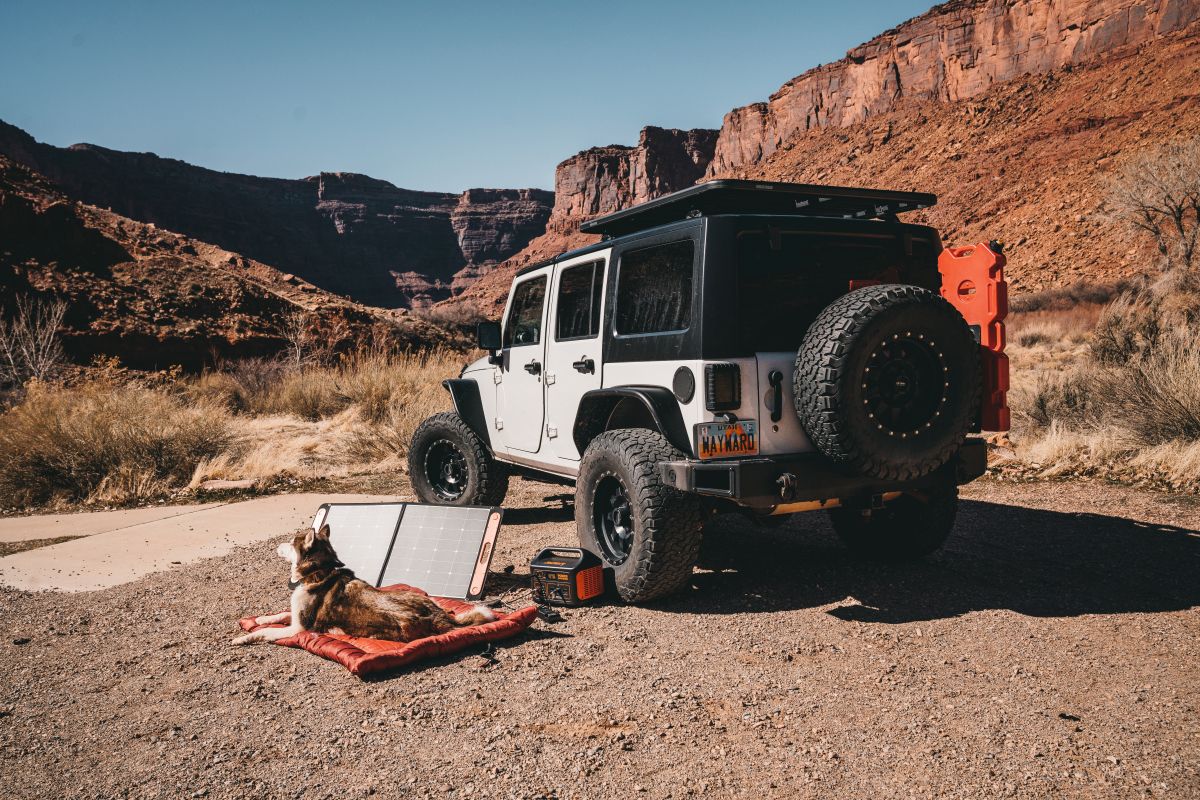
Jackery is a solar power products company with a wide range of solar generators for these situations. We recommend Jackery Solar Generator 1000 plus, 1000 pro, and 500 to power overlanding or offroading appliances.
|
Products |
Image |
Capacity |
Rated / Peak Power |
Lifespan |
Size |
|
|
1264Wh |
Rated 2000W Peak 4000W |
10yrs+ |
14 x 10.24 x 11.14in
|
|
|
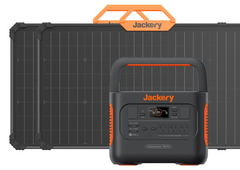 |
1002Wh |
Rated 1000W Peak 2000W |
10yrs+ |
13.39 x 10.32 x 10.06 in |
|
|
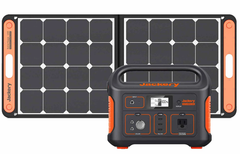 |
518wh |
Rated 500W Peak 1000W |
10yrs+ |
11.8 x 7.6 x 9.2 in |
What Is Overlanding?
Overlanding is traveling in a tough vehicle to far locations and the natural world, much like a big adventure road trip. It's a longer, more thrilling journey involving camping, exploring, and enjoying nature while frequently traveling on rough dirt roads.
In overlanding vs offroading, it is important to understand that overlanding is self-sufficient because you only bring what you'll need.
Historically, humans have traveled from place to place on foot or with animals like horses or camels. Everything they would require for the journey, including food and equipment, had to be brought. People started using cars and other vehicles for longer excursions as soon as they were developed. With their automobiles, they started traveling to distant locations and having exciting adventures.
Today, taking a trip overland is a pretty exciting and enjoyable adventure. To get to far-flung and fascinating locations, people employ specially designed vehicles, like tough trucks or SUVs, and load them up with supplies. They might travel across areas without conventional roads, such as mountains, deserts, or forests.
In modern overloading, the vehicle is the most important part of planning. Most of the facilities are now available in specially designed vehicles. Also, we have advanced technology for power supply during the trip and camping. Hence, it is more convenient yet adventurous.
What Is Offroading?
Offroading involves using special vehicles (such as trucks or all-terrain vehicles) to go on rocky, uneven roads instead of regular ones. On this thrilling adventure, you journey off the main route and visit remote locations like the Rocky Mountains, muddy pathways, or dunes.
It resembles a rollercoaster ride somewhat but in nature!
Offroading vehicles were first introduced when the Kegresse track came along in the early 1900s. Adolphe Kegresse worked for Tsar Nicholas II of Russia in 1906 and developed special vehicles, particularly for soft driving conditions on dirt, grass, and snow.
Overlanding VS. Offroading: What Are The Differences?
When discussing overlanding vs offroading, we notice that many people use these terms interchangeably. However, there are some differences when we see them in detail.
|
Overlanding |
Offroading |
|
● A long, exciting road trip. ● Long excursions spent visiting distant locations. ● In tough cars that are frequently stocked with supplies. ● Camping along the road and taking in the scenery. ● It can linger for several days or weeks. ● Emphasize independence and leisurely movement. |
● Driving off-road, on rocky, uneven trails. ● Shorter journeys, such as day outings or weekend excursions using specialist vehicles for tough terrain (trucks, ATVs) rides that are exhilarating on rocky, muddy, or sandy routes ● Concentrate on the rush of adrenaline. ● Frequently in difficult, harsh terrain. |
Overlanding vs Offroading: Pros and Cons
Offroading and overlanding are thrilling outdoor activities that require negotiating difficult, unpaved terrain. Each has unique advantages and disadvantages.
Overlanding: Pros
- Overlanding allows you to discover new places and unexplored areas for longer periods.
- You can experience nature in its purest form and enjoy a lifestyle revolving around fun and adventure.
- Overlanding is like exploring hidden treasures. You go to less explored areas, and something new is always waiting for you.
- It trains you for Accomplishment. The successful completion of a long, planned journey is different.
Overlanding: Cons
Overloading can be challenging as it requires time, money, physical effort, and environmental responsibility.
Offroading: Pros
- Offroading trips are short and crisp; hence, you can take these trips even on long weekends.
- Offroading is more affordable as you do not need rig modifications, gear, or extensive long-term travel supplies.
- More people can opt for offroading easily.
Offroading Cons
- Offroading is a low-level adventure and may only satisfy so many demanding adventurers.
- Offroading can be damaging to your vehicle.
Overlanding vs Offroading: Landscape
In terms of the landscape, overlanding includes traveling on a range of routes, including both on- and off-road trails, as part of a long journey. It involves traversing a variety of terrains to provide a comprehensive exploring experience.
Offroading, in contrast, often deviates from the usual road surface and focuses on the adventure of driving through difficult and uneven trails, including rocky or muddy pathways.
Offroading offers a thrilling and hard adventure for individuals wanting the adrenaline rush of navigating challenging regions since the terrain is purposefully rough. Each of these pursuits appeals to different tastes and levels of adventure in its special way.
Overlanding vs Offroading: Duration:
Overlanding entails lengthy journeys, frequently lasting days or weeks, emphasizing taking things slowly and appreciating each stop along the road.
The idea is that the road trip itself serves as the goal. Offroading, in contrast, offers shorter, more intense adventure spurts that often last a day or a weekend and are marked by high energy levels and the excitement of negotiating treacherous terrain.
Overlanding vs Offroading: Vehicle
Overlanding uses specialized vehicles that carry camping equipment, food, and different things for long distances to be self-sufficient and comfortable.
Driving off-road-specific vehicles, such as tough trucks or ATVs, built to handle difficult terrain and offer an exhilarating off-road experience, is known as offroading.
Overlanding vs Offroading: Gear:
Regarding gear, Overlanding includes bringing everything you need for camping, cooking, and staying alive while traveling. It entails becoming ready for self-sufficiency and comfort during protracted journeys. On the other hand, offroading entails preparing with safety gear and equipment designed for overcoming the demands of difficult off-road courses.
So, overlanding needs more equipment than offroading. Also, when you plan for power backup, Overlanding solar generators have to be small to medium like Jackery 1000 Plus, 1000 Pro, and 500 are good choices. While offroading, you need a very minimal power source.
Jackery Solar Generators for Overlanding or Offroading
One of the top producers of effective solar generators that are great for outdoor use and backup power for the home is Jackery. They have very fast charging using both wall outlets and solar panels. You can charge them using the carport. The Explorer 1000 Pro, one of its variants, can be fully charged in just 1.8 hours. Additionally, it's cool since you can use it to power items while charged. The fluctuation-free supply of power also saves your equipment.
Jackery solar generators are like simple electrical machines. You connect them to solar panels and put them under the sun. The magic of the sunlight is converted into electricity.
The generator transforms this energy into the electricity that makes your devices work, like phones and lights! It's easy and amazing!
Jackery Solar Generator 1000 Plus
With a capacity of 1264Wh and 2000W, the 1000 Plus power station stands out for its exceptional power-to-size ratio and versatility for various devices.
Up to three more battery packs can be connected to it to add 5 kWh of power, sufficient for backup for one to three days.
It complies with strict environmental regulations and is notably eco-friendly.
Up to 10 years, or roughly 4,000 charging cycles, are guaranteed by the LiFePO4 battery.
Using a mobile app with intuitive smart control through WiFi or Bluetooth makes managing this power source simple and effective.
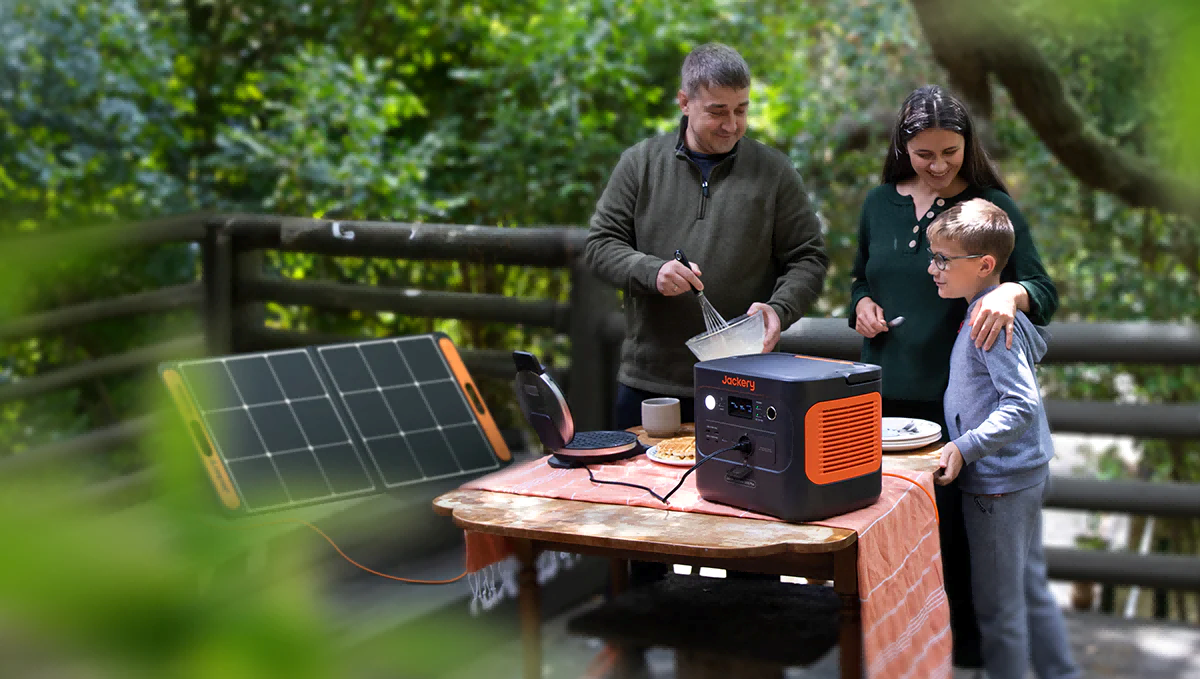
Jackery Solar Generator 1000 Pro
With a quick solar charging time of just 1.8 hours, the Jackery Solar Generator 1000 Pro dazzles.
It offers enough energy thanks to its large 1002Wh capacity and 1000W power output (boostable to 2000W).
With a lifespan of over 10 years and the capacity for regular usage, durability stands out. It is an environmentally responsible choice to harness solar power silently.
The waterproof, foldable, lightweight solar panels are a key feature that makes it convenient to carry this small, portable generator wherever you go.

Jackery Solar Generator 500
The Jackery Solar Generator 500 is a powerhouse with a storage capacity 518Wh and an average power output of 500W, with a brief surge to 1000W when needed.
It is versatile for outdoor activities and offers three simple power-up methods. It has 7 device plug-ins.
It runs on solar power and is noiseless and pollution-free. The solar panels are waterproof, collapsible, and portable, improving usage and providing an affordable electricity source wherever you go. Its small size and light weight make it easy to transport.
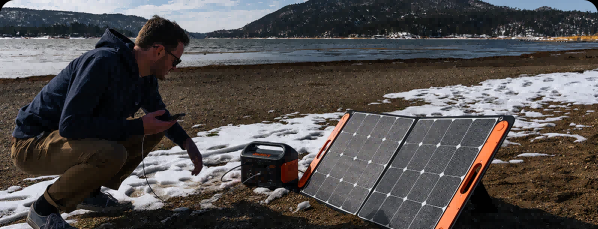
|
Products |
Capacity |
Battery |
Output Ports |
Overlanding Electronics |
|
1264Wh |
Lithium Iron Phosphate (LiFePO4) |
AC Output(x3): 120V~60Hz, 2000W (4000W Peak) |
Coffee Maker(1300W)=1.3H Car Fridge(60W)=45H Electric Cooker(900W)=1 H Portable Air Conditioner(1150W)=1 H Refrigerator(Insulation)(15W)=44H Microwave Oven(1160W)=1 H Drone(90W)=29 Times |
|
|
USB-A Output(x2): 18W Max, 5-5V⎓3A |
||||
|
USB-C Output(x2): 100W Max, (5V, 9V, 12V, 15V, 20V up to 5A) |
||||
|
1002Wh |
Ternary Lithium Battery |
3 x AC Output (1000W, 2000W Surge Peak) |
Blender(300W)=2.5 H Space Heater(350W)=2.5 H Ice Shaver(700W)=1.2 H Coffee Maker(550W)=1.5 H Toaster(650W)=1.3 H Microwave(700W)=1.2 H Kettle(850W)=1 H |
|
|
USB-A, 18W Max |
||||
|
2x USB-C Output PD 100W MAX |
||||
|
518 Wh |
Li-ion NMC |
AC Output(x1): 110VAC, 60Hz, 500W (1000W Surge) |
Phone(18W)=22.6 Charges Blender(300W)=7 H Space Heater(300W)=1.5 H Coffee Maker(550W)=0.8 H Toaster(650W)=40 Min
|
|
|
DC Input:12V-30V (100W Max) |
||||
|
DC Output(x2):12V, 7A USB-A Output(x3):5V, 2.4A |
Which One Is Right for You?
Overlanding vs offroading, the best choice for you, depends on your mood, stamina, preparedness, and time. Overlanding is like a big road trip where you explore faraway places and camp, while offroading is about driving on difficult and adventurous paths.
You would prefer overloading if you like going on a big adventure road trip; we can explore faraway and exciting places and enjoy camping.
On the other hand, traveling by land could be perfect if you like to take time, immerse yourself in nature, and have a flexible trip.
Overlanding VS. Offroading FAQs
1) What size of solar generator do I need for my overlanding or offroading?
It depends on how many days you will be living outdoors, what appliances you will be running, and for how long. Also, the space in your vehicle matters depending on the dimensions of the generator. Generally, Jackery solar generators 1000 Plus, 1000 Pro, and 500 are optimum choices.
2) Why do they call it overlanding?
Overlanding meant driving cattle to long distances across the Outback. However, later, it evolved to refer to long travels exploring nature.
3) What are some tips for starting overlanding or offroading?
Overlanding:
- Make a plan: Conduct research, map out campsites, and purchase supplies.
- Bring first aid kits, food, drink, a place to stay, and equipment.
- Check your car to make sure it's ready for the journey.
- Use apps, GPS, or maps for navigation assistance.
- Respect for Nature.
- Drive cautiously, abide by the law, and put your safety first.
- Join overlanding communities to connect with other travelers, share experiences, and gain knowledge.
Offroading:
- When offroading, the right vehicle can handle rocky terrain.
- Understanding the terrain will help you prepare for the terrain you'll be driving on.
- Make sure your tires are well-inflated and suitable for rocky terrain by checking them.
- Driving Techniques: For efficiency and safety, learn and practice off-road driving.
- Carry tow straps, shackles, and a winch if you require rescue equipment.
- Drive with others for safety and assistance in case of emergencies.
- Please stick to the paths that have been established and respect the environment to preserve it beautiful for all.
Final Thoughts
Offroading and overlanding are two fun ways to take in the outdoors. However, people may use both terms interchangeably. However, there is a lot of comparison in overlanding vs offroading. We have discussed this in different aspects, including gear, solar generators, vehicles, etc. It is important that whatever type of trip you take, always consider the requirements for planning and acquiring the right products for you. Pick up the most sturdy vehicle, choose the right size of a Jackery solar generator, carry enough food and water, and always keep your navigation tools charged and ready.
Disclaimer:
The runtime mentioned for appliances powered by Jackery is for reference only. Actual runtime may vary under different conditions. Please refer to real-world performance for accurate results.






































































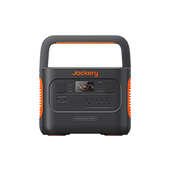





































Leave a comment